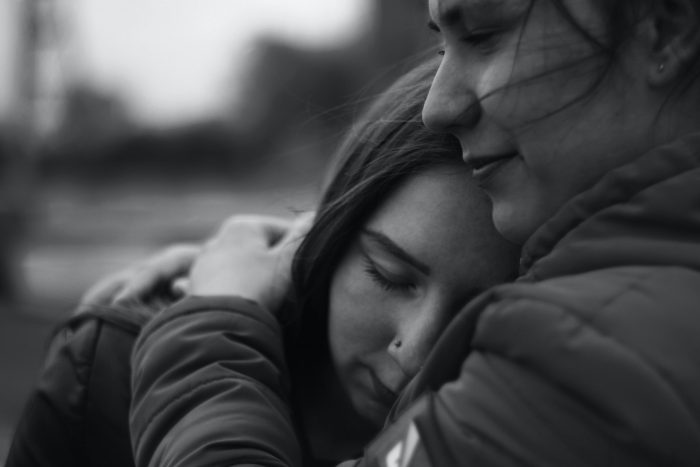Come rest, dear ones.
I feel it too. We’re all tired and overwhelmed and desperately needing a reprieve from bad news.
Our hearts bear the weight of what they’ve experienced, what that they’re bearing witness to, and all that’s uncertain and yet to come. They’re beating tenaciously and muscling through with an underlying yearning for change, and perhaps some fear of it too.
There’s so much unrest out there that it’s difficult to feel at ease within. It’s the all too familiar existential fatigue that craves relief and wants to move from surviving to thriving. Now more than ever, we need reminders that the world is good, and as Richard Schwartz often encourages, we need to be merchants of hope.
We are not wired for prolonged states of crisis. It’s difficult to live in a world where atrocities abound. Undoubtedly, our ancestors faced many harrowing challenges, but they didn’t wake up to relentless horrific news. They were mostly unaware of suffering and strife in areas beyond their communities. Now, the world feels smaller. Everyone is our neighbor. We are being asked to hold space for so many and so much that shock and pain often elicit more anger, numbness, and disconnection. Our nervous systems are on overdrive. We so urgently need resolution and healing—collectively and individually.
Change, even global, does not come from pernicious denial of personal accountability. As we navigate toward a global community, it’s important to hold our attention on an integral sense of me while aligning with the we. This is not careless or indulgent; on the contrary, it ensures that we embody the desired change and lead from example. We simply start where we are and do what we can.
No singular person or government will swoop in and rescue us. Waiting for others to change or understand or apologize or do better means we’re operating from a disempowered state. A big part of the problem is that as a society, we carry many of our own wounded parts that still don’t feel safe. We sense the need for relational and environmental safety, but we’re unpracticed at how to do it.
Unfortunately, repetition compulsion means that the subconscious seeks what is familiar. We are wired to re-experience suffering unless we turn toward dysfunction and intentionally interrupt it. Generational trauma is insidious this way, but we need not resign to it. When we envision change, it must be with a well-being that is comprehensive enough and expansive enough that it can hold us all. Healthy boundaries do not tolerate harm or violence, ever. But they don’t resort to it either.
But how do we even begin to ease out of fearful projections and states of disconnection?
We must first believe it’s possible, and then fortified with hope, we leap. There’s no path to follow. We simply commit to showing up with compassion for our past, reverence for the present, and hope for the future. Hope is the vision we hold, it is the balm for all fatigue, and it’s where our soul goes to rest.
Meeting trauma with hope and compassion greatly facilitates its healing. We need to be resourced and resilient as we usher suffering back to states of ease. We need restful places to lay our tired bodies and burdened minds. We need to be armed with practices and people who we can take refuge in. We need to explore what gives significance to life beyond the biological, social, or material constructs. We need to encourage safe expression, tolerance, and conflict resolution. We need something to sustain us as we endure oscillating between active truth-seeking and surrendered trust, hope, and despair. That something is each other.
Relational safety means that we can be a resource of acceptance, comfort, and care for each other. Community, trust, and reciprocity is what helps us to feel connected and unified by human experience, including experiences of suffering. When it comes to bridging differences, understanding is infinitely more effective than judgment. It’s about sustainable interconnectedness over selfishness or selflessness.
We each participate in this transformation a little differently, taking great care of our physical and emotional well-being, lest we burn out. Growth is a long-term investment. It can feel like a lot. It’s like exploring an ocean when all we’ve known is a shore. Venturing out is less scary if we’re anchored in hope during the turbulent days when we feel lost and unmoored, because those days will come.
Whatever suffering we may experience, we are not choiceless in how we meet it. For every hurtful event or hateful person out there, there are many moments of kindness and unity, and people who want harmony over division. The world is still good. Whether it be with our spouse or with a stranger, in person or online, in the world or in our neighborhood, our personal power in any difficult situation lies in how we choose to respond. When aligned with integrity, no thought or action is too small. Remember that even mighty trees were once small seeds.
Relational safety is the resolve to do no harm. It does away with all threat. What would happen if we all committed to do no harm verbally, physically, emotionally, environmentally, economically?
By keeping each other safe, we can let down our guard and get busy healing, growing, and creating. Reciprocal well-being and harmonious environments are effortless, natural by-products of relational safety. We get a break from vigilance and reactivity. We would be able to begin planting seeds for something mighty and beautiful to take root. And, finally, let out a collective exhale.
~
Please consider Boosting our authors’ articles in their first week to help them win Elephant’s Ecosystem so they can get paid and write more.












Read 8 comments and reply